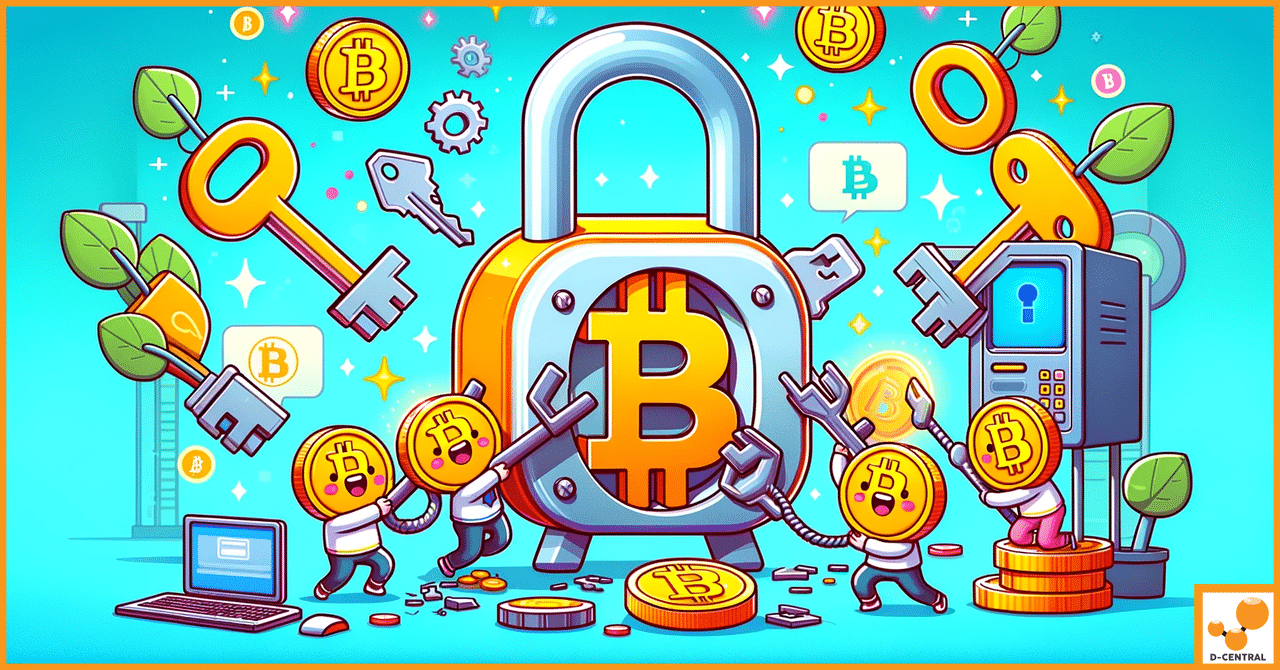
Championing Quebec’s New Right to Repair Law in the Bitcoin Mining Industry
In the rapidly evolving world of Bitcoin mining, one company stands out for its commitment to sustainability and environmental responsibility.
4479 Desserte Nord Autoroute 440, Laval, QC H7P 6E2

In the ever-evolving world of digital currencies, Bitcoin stands as a pioneering force, heralding a new era of financial transactions and investment strategies. At the heart of its secure and decentralized nature lies the concept of private keys, a critical component that empowers users with exclusive control over their Bitcoin assets. These private keys are not just random strings of characters; they are the linchpin of Bitcoin’s security model, ensuring that only the rightful owner can access and manage their holdings.
As we delve into the realm of cryptographic security, one cannot help but encounter the concept of brute-forcing. This technique, in the context of cryptography, refers to the method of systematically attempting every possible combination of characters in search of the correct key or password. It is the digital equivalent of trying every key on a massive keychain to unlock a door. The brute force method has been used, with varying degrees of success, to breach various cryptographic systems, raising questions about the resilience of these systems against such relentless onslaughts.
This article aims to explore the feasibility and implications of brute-forcing Bitcoin private keys. Given the formidable nature of Bitcoin’s cryptographic foundation, is it realistically possible to brute force a private key? What does this mean for the security of Bitcoin holders? These are crucial questions for understanding the robustness of Bitcoin’s security and the future of digital asset protection. As we navigate through these complex waters, it becomes increasingly apparent that the security of Bitcoin is not just a technical issue, but a cornerstone of its value proposition in the digital age.
In the Bitcoin ecosystem, a private key plays a pivotal role, acting as the individual identifier and security mechanism for Bitcoin users. It is essentially a secret number that allows Bitcoins to be spent. Every Bitcoin wallet contains one or more private keys, which are saved in the wallet file. The private keys are mathematically related to all Bitcoin addresses generated for the wallet. Thus, they are the cornerstone of the Bitcoin security model.
Private keys are generated using cryptographic algorithms. In the case of Bitcoin, a private key is typically a 256-bit number. This means it’s a number that can be represented by a string of 256 binary digits (0s and 1s). The vastness of this range makes each Bitcoin private key unique and extremely difficult to predict. The generation of these keys is usually done in a manner that ensures randomness, a critical aspect that underpins the security of the Bitcoin network. Modern Bitcoin wallets generate private keys in a way that is both random and secure, thereby ensuring that the keys are not susceptible to prediction or brute-force attacks.
The relationship between private keys and public keys is foundational to Bitcoin’s cryptographic design. A public key is derived from the private key using elliptic curve multiplication, which is a one-way cryptographic function. This means that while you can easily generate a public key from a private key, it is practically impossible to do the reverse. The public key, in turn, can be used to generate Bitcoin addresses, which are the addresses used for receiving Bitcoin. This hierarchical structure ensures that while transactions are publicly recorded on the Bitcoin blockchain, the ownership and control of the Bitcoins remain private and secure.
In summary, the private key in Bitcoin is not just a password or a means of access. It represents the ownership and control of the user’s bitcoins, and its security is essential for maintaining the integrity and trust in the Bitcoin network. The cryptographic relationship between the private and public keys is what enables Bitcoin to function as a secure, decentralized digital currency.
A brute force attack in cryptography is a straightforward yet computationally intensive approach to password cracking. It involves systematically trying every possible combination of characters until the correct one is found. This method does not rely on any intellectual strategy but rather on sheer computing power, testing all possible keys or passwords until the correct one is discovered. The simplicity of this method is both its strength and its weakness.
General Application of Brute Force Attacks in Cryptographic Systems
Brute force attacks are commonly employed against various cryptographic systems, including those used in encrypting data, securing networks, and protecting password-protected devices. They are a universal tool in the arsenal of hackers and cybersecurity professionals alike, used to test the strength of cryptographic systems. The logic is simple: if a system’s encryption can be broken by a brute force attack, it is not secure enough. This method is often used as a last resort when other, more sophisticated attacks (like those based on known vulnerabilities or cryptographic flaws) are not viable.
Challenges and Limitations of Brute Force Attacks
The primary challenge of brute force attacks is the immense amount of time and computational resources they require. The strength of a cryptographic system is often measured by how resistant it is to brute force attacks, typically indicated by the length and complexity of the key. For instance, a 128-bit key would take significantly less time to crack than a 256-bit key, all else being equal.
Another significant limitation is the practicality of such attacks. With increasing key sizes and complexity, the time required to successfully complete a brute force attack can become prohibitively long. For strong cryptographic systems, this could mean thousands, millions, or even billions of years with current computing technology. This impractical timeframe renders brute force attacks ineffective against robust encryption standards.
Furthermore, many cryptographic systems implement security measures that further complicate brute force attacks. These can include lockouts after a certain number of failed attempts, increasing the time between allowed attempts, or even self-destruct mechanisms that render data inaccessible after repeated failed access attempts.
While brute force attacks are a fundamental concept in cryptography, their practical application is limited by their need for substantial computational resources and time. The evolution of cryptographic techniques continues to focus on increasing resistance to such attacks, making them an impractical method for breaking into well-secured systems.
The concept of brute-forcing a Bitcoin private key might seem straightforward, but its practical application is far from feasible due to several factors, most notably the astronomical number of combinations in a 256-bit key.
Sheer Number of Combinations in a 256-bit Private Key
A Bitcoin private key, being a 256-bit number, has an enormously vast range of possible combinations. To put this into perspective, the number of potential combinations is comparable to the estimated number of atoms in the universe. This comparison helps to underscore the sheer scale of possibilities, making the task of guessing a private key akin to finding a specific grain of sand in all the beaches of the world.
Mathematical and Computational Challenges Involved
From a mathematical standpoint, the challenge is monumental. The process of brute-forcing involves testing each possible combination until the correct one is found. Given that the number of possible keys is 2^256, even with the fastest supercomputers, this process would take an inordinate amount of time, far exceeding the lifespan of the hardware and, indeed, the human race.
Timeframe Estimations for Brute-Forcing a Key with Current Technology
Estimates suggest that even with the most powerful supercomputers available today, brute-forcing a single Bitcoin private key could take longer than the age of the universe. This is not just a hyperbolic statement but a realistic assessment based on current computational capabilities. Such estimates are grounded in the reality of computational limits and the exponential nature of the problem at hand.
Expert Opinions and Studies
Numerous experts in the field of cryptography and blockchain technology have weighed in on this subject. Their consensus strongly supports the impracticality of brute-forcing Bitcoin private keys. For instance, renowned figures in the cryptocurrency space, like Andreas M. Antonopoulos, have often highlighted the robustness of Bitcoin’s cryptographic security. Similarly, studies in the field of computational mathematics consistently demonstrate the impracticality of brute-forcing these keys, given the current and foreseeable advancements in computing power.
In summary, while the theory of brute-forcing a Bitcoin private key may be conceptually simple, the practical reality is that it is currently impossible due to the overwhelming number of combinations and the limitations of existing computational technology. This underscores the strength of Bitcoin’s cryptographic security and gives users confidence in the safety of their digital assets.
In the realm of cryptocurrency, understanding the distinction between private keys and seed phrases is crucial. A private key is a unique 256-bit alphanumeric code that grants access to the cryptocurrency associated with it. This key is essentially what allows a user to spend their Bitcoins. On the other hand, a seed phrase, also known as a recovery phrase or mnemonic seed, is a set of words (typically 12 or 24) generated by your Bitcoin wallet. This seed phrase can be used to regenerate your private keys in case your wallet gets lost or damaged. Essentially, while the private key is the critical component for transactional operations, the seed phrase is a user-friendly backup tool that aids in the recovery of private keys.
Vulnerabilities and Security Measures for Seed Phrases
While seed phrases are an effective backup mechanism, they are not without vulnerabilities. The primary risk is that anyone who gains access to your seed phrase can potentially access your funds. Unlike private keys, which are alphanumeric and complex, seed phrases consist of common words and can be more susceptible to physical theft, social engineering attacks, or simple human error.
To mitigate these risks, several security measures are recommended:
Best Practices for Securing Private Keys and Seed Phrases
Securing your private keys and seed phrases is paramount in safeguarding your cryptocurrency assets. Here are some best practices:
By adhering to these best practices, users can significantly enhance the security of their Bitcoin and other cryptocurrency assets, ensuring that their investments remain safe from unauthorized access and potential theft.
Throughout this discussion, we have delved into the intricacies of Bitcoin’s security mechanisms, particularly focusing on the role and robustness of private keys and seed phrases in the Bitcoin ecosystem.
In conclusion, the security of Bitcoin private keys and the broader domain of cryptographic security continue to be areas of immense importance and constant evolution. As digital assets become increasingly integrated into our financial systems, the need for robust security measures becomes more critical. It is essential for individuals and organizations alike to stay informed and proactive in implementing and maintaining digital asset security.
We at D-Central Technologies are dedicated to providing comprehensive insights, resources, and services in the realm of Bitcoin mining and security. Our expertise in this field positions us to be a valuable partner for anyone looking to navigate the complexities of cryptocurrency securely and effectively.
We encourage you to visit D-Central Technologies for more information and assistance. Our platform offers a wealth of educational resources and services tailored to meet the needs of both new and experienced users in the Bitcoin mining community. Embrace the opportunity to deepen your understanding and enhance your practices in the secure management of digital assets with D-Central Technologies.
What is a Bitcoin private key?
A Bitcoin private key is a unique 256-bit alphanumeric code that allows the holder to access and spend the Bitcoin associated with it. It is generated using cryptographic algorithms and ensures the security of the user’s Bitcoins.
What is brute-forcing in the context of cryptography?
Brute-forcing is a method of attempting every possible combination of characters systematically to discover the correct key or password in cryptographic systems. It relies on sheer computing power and is considered an impractical approach to breaking robust cryptographic systems like Bitcoin due to the immense number of potential combinations.
Is it feasible to brute-force a Bitcoin private key?
No, it is currently impractical to brute-force a Bitcoin private key because a 256-bit key has an astronomical number of possible combinations, taking longer than the age of the universe to test each one with current computing technology.
What is a seed phrase in cryptocurrency?
A seed phrase, also known as a recovery phrase or mnemonic seed, is a set of words (usually 12 or 24) generated by your Bitcoin wallet that can be used to regenerate your private keys should your wallet become lost or damaged.
How can the security of seed phrases be compromised?
The security of seed phrases can be compromised through physical theft, social engineering attacks, or human error, as they consist of common words and are easier to expose than private keys.
What are some security measures for protecting private keys and seed phrases?
To protect private keys and seed phrases, it is advised to use hardware wallets, multi-signature wallets, keep your software updated, avoid digitally storing seed phrases, stay informed about security threats, and use trusted software only.
Can D-Central Technologies assist with Bitcoin mining and security?
Yes, D-Central Technologies provides insights, resources, and services related to Bitcoin mining and security. They offer educational resources and tailored services for both newcomers and seasoned users in the Bitcoin mining community.
DISCLAIMER: D-Central Technologies and its associated content, including this blog, do not serve as financial advisors or official investment advisors. The insights and opinions shared here or by any guests featured in our content are provided purely for informational and educational purposes. Such communications should not be interpreted as financial, investment, legal, tax, or any form of specific advice. We are committed to advancing the knowledge and understanding of Bitcoin and its potential impact on society. However, we urge our community to proceed with caution and informed judgment in all related endeavors.
Related Posts

In the rapidly evolving world of Bitcoin mining, one company stands out for its commitment to sustainability and environmental responsibility.

The world of cryptocurrency mining has surged in popularity as more individuals and businesses seek to capitalize on the potential

In recent years, a significant debate has emerged in the financial and technological communities regarding the energy consumption of Bitcoin,